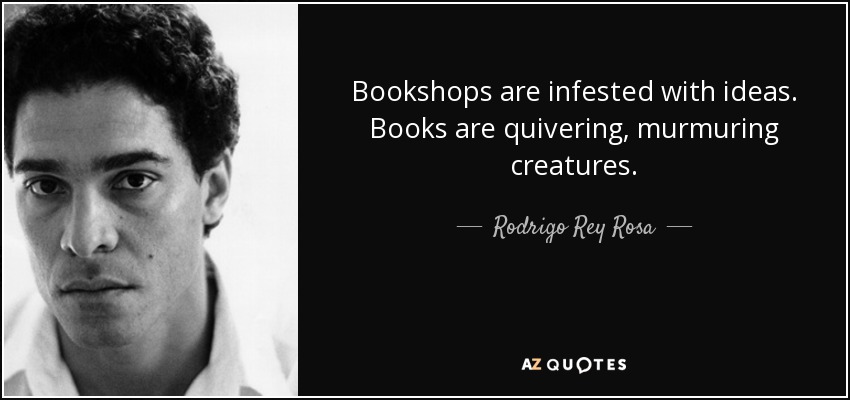Scan barcode
A review by glenncolerussell
Dust on Her Tongue by Rodrigo Rey Rosa
5.0

Rodrigo Rey Rosa (born 1958) -- A Guatemalan writer who bases the majority of his stories on indigenous Latin American legends and myths. Twelve short sparse tales in this collection set in Guatemala among everyday men and women. There is no explicit symbolism spelled out yet the relationships between objects, happenings and people are charged with compressed energy, infusing each scene with uncompromising and frequently harsh drama. To provide a taste of the author’s voice and the rhythm of his telling, I will focus on one tale I found particularly powerful:
CORALIA
An older gentleman at a table in a small restaurant tells his lady friend, a foreigner with auburn hair and very pale skin, about a woman he judges to be great and how she will really love this great woman.
Such an irksome, annoying statement – when we are told how we will love or have strong emotions toward another person without having once met that person.
Meanwhile, the plot thickens: overhearing this remark, a young man at the next table informs his girlfriend how the older gentleman is talking about Coralia and how Coralia has an ego as big as a cathedral.
At that moment Coralia herself enters the restaurant, head held high, looking neither to the left nor to the right. The older gentleman, Señor Méndez, rises to greet her. Coralia explains how she was, in fact, looking for him so as to ask the Señor if she could rent his truck to pick up some wood she already paid for.
Taking on the role of gallant friend, Señor Méndez tells Coralia that he himself will gladly pick up and deliver her wood. Delighted, Coralia offers to host coffee at five o'clock at her home for Señor and his lady friend as a way of extending her gratitude.
Coralia briskly walks to the door but catches sight of Enrique out of the corner of her eye and cries: “Enrique!” Enrique stands and hugs her.
Señor Méndez and his lady friend walk past and tell Coralia they will be at her home at five o’clock for that coffee.
Now that she knows her wood will be delivered, so much for Señor Méndez; Coralia has much better things to focus her attention on at this moment: a young man for whom, as we find out later in the story, she has a deep, powerful emotional attachment.
No sooner is Coralia in the front seat of Enrique's car, squeezed between driver and his girlfriend, Rita by name, then we read: “She informed them that she was a very candid person, and that she liked to tell the whole story from the beginning. She kept nothing back (she did not know what shame was) and that whoever objected to this should say so at the start.”
In so many words she is telling them: my life story is the most important thing in the world and I plan to command center stage and take as much time as I want to tell my whole story.
I’ve always found such obnoxious pronouncements, as this one by Coralia, disturbing and ugly in the extreme. And for a number of reasons, not the least of which is all the other people around them are reduced to passive listeners and tacitly judged inferior. A colossal egotism is at work here.
True to form, once Coralia begins telling her life story, it goes on for hours: how she emerged victorious from a hard childhood, suffering at the hands of drunken father and indifferent mother, how she heroically overcame the nuns at her convent school, but once she discovered the beauty of her voice . . . . bhah, bhah, bhah.
Enrique reminds Coralia of the time, that it is now well after five o’clock. Rita says “Poor Señor Méndez.” Coralia is surprised at the interruption of her story.
Coralia discovers the hard way there is a price to pay for ignoring her friends. Here is how Rodrigo Rey Rosa ends his tale: “A few yards after he had crossed the river Enrique had to make way suddenly for a small truck with blinding headlights which bore down upon them from the other direction. Rita turned to look. “Señor Méndez!” she exclaimed. Señor Méndez had stopped his truck at the edge of the river. They saw him climb into the back of the truck and leaning against the cabin’s partition, kick the logs furiously out of the truck, so that they rolled down the bank into the water and floated off downstream. The sky was full of stars.”
